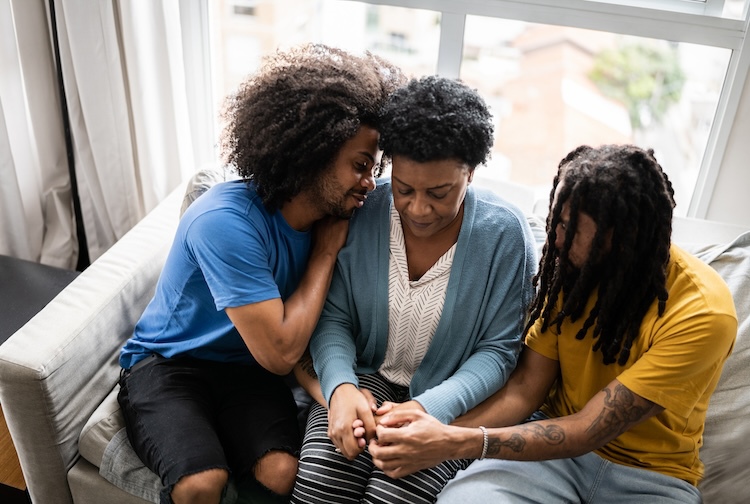
Dealing with grief and creating new family traditions
Co-organizer of the VCU Health caregiver support group shares how families can cope with the loss of a loved one while honoring their memory during holidays and anniversaries.
December 11, 2023 A social worker at VCU Massey Comprehensive Cancer Center recommends being upfront with trusted family and friends about the best ways to support you while you’re experiencing grief. (Getty Images)
A social worker at VCU Massey Comprehensive Cancer Center recommends being upfront with trusted family and friends about the best ways to support you while you’re experiencing grief. (Getty Images)
By Sara McCloskey
Certain times of the year are special for families and friends. Whether you’re going to see a seasonal show or cook a traditional family recipe, these activities often bring up cherished memories of loved ones who may not be with us anymore.
Grieving the loss of someone you were close to is difficult at any time of the year, but holidays or anniversaries can be painful reminders of their absence. But there are approaches to prepare yourself for these challenging moments, and also ways to create new traditions with your family to honor passed loved ones.
Kerri Anderson, MSW, is a licensed clinical social worker who works in the Palliative Care Department at VCU Massey Comprehensive Cancer Center, caring for patients living with chronic or terminal illnesses as well as their caregivers and family members. She also co-leads a caregiver support group at VCU Health.
“Be patient with yourself when experiencing a first holiday without your loved one,” Anderson said. “Recognize that your feelings are all normal parts of the grieving process; setting expectations early and finding support from others will be helpful parts of your adjustment.”
Anderson spoke with VCU Health News about how to support yourself and others grieving over the holidays and new ways to celebrate.
Holidays or anniversaries can be difficult times for individuals who have lost a loved one or a friend. During those times of the year, what are some of the challenges patients, caregivers and family members experience?
Holidays and anniversaries play a very important role in our lives, many of which are focused on spending time with family. When our loved ones have passed away, many people find the pain of not being able to spend time with them unbearable.Over time, the pain may subside but occasions that are full of special memories will surely bring forth an overwhelming sense of grief and loneliness we may have thought was improving – and even more at a time when we’re expected to be joyful and open.
People adjusting after a loss grieve in many ways. Some may not want to engage in traditional family activities as some may find it comforting. Many express the challenge of communicating their choice to their family in a way that doesn’t silence their grief or forget who was lost.
How can someone prepare themselves emotionally for when that day comes around?
First, I would recommend setting expectations for yourself early. Remind yourself that this certain holiday, event or anniversary will likely be challenging for you. Make those you trust aware of your expectations too. Ask them beforehand if they can spend time with you, call you to check-in, or even send you a funny picture of your loved one that you know will lift your spirits. Doing this in advance will help give direction to those who may not know how to support you too.Also, do your best not to avoid the holiday altogether. It’s important to recognize your limits, but don’t intentionally isolate yourself. If you do feel time alone is needed for you, try to engage in mindful activities like writing a letter to your loved one, going on a walk somewhere you know they would enjoy, or listening to the album they gave you that you enjoyed listening to together. Try to find moments of connection with your loved one.
How can individuals or families incorporate new traditions to honor and remember a loved one?
There are so many ways you can keep your loved one involved in your holiday traditions. Many cultures place pictures or mementos of the deceased on a special table or other important location. Some light candles to represent those who are not able to be with them during the holidays.It is also helpful to announce the symbolic item. Instead of just having a candle burning that you privately know is for your loved one, say to the family “this candle is for Aunt Jean who is with us in spirit.” Simply naming those we have lost in a toast or prayer can be very meaningful.
Not everything has to be so serious though. Watching a favorite movie or playing a favorite game can still be a tradition that reminds you of your loved one.
What are the best ways to support someone you know who has recently experienced a loss or has difficulty around holidays because of a family member not being present?
Remember grief comes in waves. Sometimes it is receding and sometimes it is pulling you under. Because of this, it is important to remind this person in your life that there really is no “normal” way to grieve. Help them identify their triggers and, above all, help them keep the spirit of their loved one alive.Many folks coping with loss feel they cannot talk about the deceased without upsetting everyone or having family awkwardly negate their feelings. Ask them about memories with their loved one to help them stay connected. Step into that space to allow them to open up, reminisce and even cry if they want. More often than not, you will find yourself laughing over some of the best memories of their lifetime.
Holidays and anniversaries are often filled with family members of all ages. What are the best approaches to talk about grief and death with children?
Remember that death is a normal part of life. The way we talk about and honor our loved ones after they pass demonstrates to our children positive coping skills when it comes to grief.
Don’t shy away from including children in these rituals and conversations. Depending on their age, you can help them participate in new traditions like lighting the candle or making a memory ornament for the parent or grandparent. These are important in passing along memories and traditions to the next generations.



